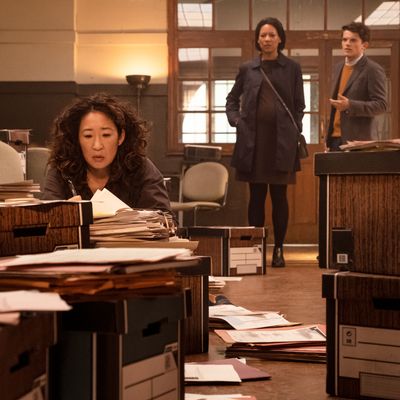
Villanelle and Konstantin are in Amsterdam, about to embark on the first murder project of their new partnership, and Villanelle is already bored by her uninspiring first target. “Well, make it fun,” says Konstantin. “Show Eve Polastri what’s she’s missing. Show her how boring this other woman is compared to you.”
For inspiration, Konstantin takes her to the nearby Rijksmuseum where she snores and snorts at the paintings of sculpted buttocks and fig-leafed crotches of nubile young men. Finally, one masterpiece catches her eye: “The Corpses of the de Witt Brothers” by Jan de Baen, a gruesome portrait of a true event: the 1672 lynching of two aristocratic Dutch politicians, Johan and Cornelis de Witt, and the display of their mutilated corpses. Their hearts, notably, were carved out, and other parts of their bodies were reportedly sliced off and eaten by the mob. The method of their death and the treatment of their bodies was both an act of coordinated rage and a form of public humiliation designed to reduce two very powerful men to pieces of meat.
“They look like bacon,” Villanelle muses to Konstantin, transfixed. Great art is supposed to inspire, after all. Later, while she watches a mother and father push a baby carriage down the street, she mails Eve a postcard of the same painting, with a love note on the back: “Darling Eve, I hope you haven’t forgotten about me!” She’s multitasking; the husband is the “boring” target of her next hit, which she carries out in the red light district of Amsterdam.
We don’t get a lot of time with this shithead, nor do we need a lot, but it’s quickly apparent that he’s the sort of scumbag who can flip from sweet-talking a sex worker to calling her a whore and tacitly threatening her in a heartbeat. Nearly every female viewer will be familiar with this sort of whiplash-inducing heel turn from seducer to abuser — the “fucking bitch!” that lurks behind the catcall of “hey sexy,” the entitled hatred that seethes beneath desire.
That makes him neither remarkable nor interesting, and it’s no wonder Villanelle sees her subject as undeserving of her craft. He’s the sort of bargain-bin, half-off acrylic that Villanelle is disgusted to even touch with her brush, but still — the art has been commissioned and so it must be made.
Villanelle knows how to dress for an occasion, and she dons a pink, pom-pommed peasant dress and a pig mask to lure him into a brothel, suspend him from the ceiling like a side of pork, and then gut him in front of a crowd of cheering onlookers who think it’s all a performance. To Villanelle, of course, it is. And like all good art, it has something to say. Sure, there’s the obvious inversion of social and physical power, the dehumanization of a man who clearly enjoys dehumanizing women. But at the heart of it all there’s a more personal hunger on display, aimed squarely at the one-woman audience of Eve: pay attention to me, appreciate me, love me still and again.
If she had set out to “make it fun” and draw Eve’s wandering eye away from the Ghost, however, the project fails on both counts. When she’s done, Villanelle pouts to Konstantin that she felt “nothing,” and despite her waiting with bated breath by a window across from the crime scene, Eve never appears. It isn’t an intentional snub, though Villanelle has no way of knowing that Carolyn has intercepted the bloody valentine, plucking it out of MI6’s mail before it can reach Eve. Carolyn sends Jess to Amsterdam to investigate the murder instead and keeps Eve focused on the Ghost, who continues to drop bodies connected to the Peele family and their shadowy tech corporation.
Carolyn’s “do actual work instead of derailing your career over a psychosexual fixation” initiative soon bears fruit. In addition to correctly hypothesizing that the Ghost uses the anonymity of female service workers as an invisibility cloak, Eve picks up on an unusual quirk of the Ghost’s MO — she’s a compassionate assassin who uses medical knowledge to kill painlessly — and it isn’t long before they track the Ghost down to the school her children attend and take her into custody.
Later, as Eve waits in the interrogation room for the Ghost, she fusses with her hair in the one-way mirror as Carolyn watches from the other side. Villanelle told her once, the first time they met, to wear it down — and ever since then, she has. Now, as Carolyn watches from the other side of the glass, Eve carefully gathers her hair into a bun. It feels a bit like putting a uniform back on, or taking a token of her lover off.
No one likes this less than Villanelle, who spends her day lying in bed on the verge of tears, looking every bit like someone who’s been rejected — or ghosted — by her beloved. Perhaps unaccustomed to the feeling of heartbreak (or to feeling in general), she deals with it by taking a lot of drugs, stumbling around a nightclub, and beating someone up in the bathroom before Konstantin has to intercede and carry her out.
She wakes the next morning, her sheets covered in puke, and cries in front of the mirror. It’s a rare messy, vulnerable moment for Villanelle, and one that reveals that there’s real intimacy and emotion on the line, as well as the capacity to get hurt, which is what makes it so intoxicating and dangerous for her and Eve alike. That’s what this sort of love can do, after all: turn your world upside and gut you; tear your heart out and eat you alive.

